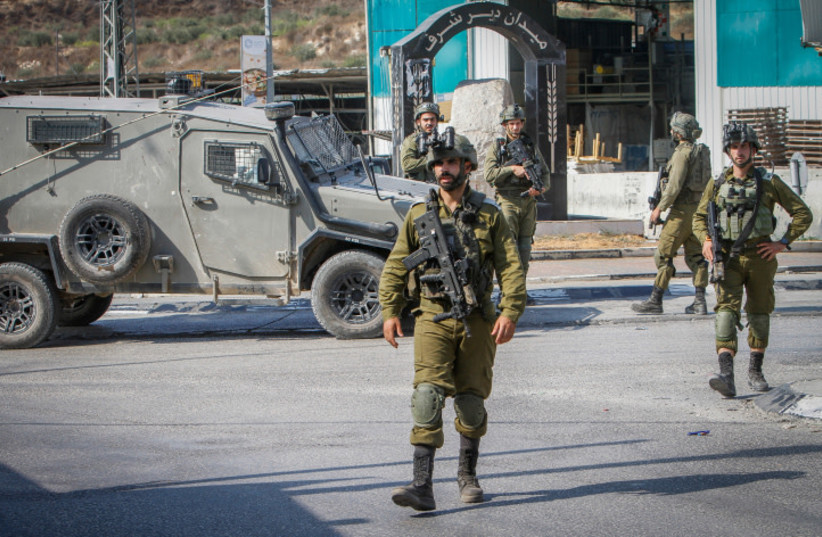It has been a problem for years, which spiked in February 2023 and again since October 7: The IDF and law enforcement are weak on cracking down on Jewish terrorism against Palestinians when it does arise.
Since the weekend, there have been at least three such significant incidents, and while the IDF and police are both said to be investigating, it is unclear what efforts were made to prevent the actions of Jewish extremists, making these moves ineffective.
In contrast to the battlefield, where the IDF has robust – if imperfect – mechanisms for reviewing errors or rogue actions against Palestinians, the preventing or prosecution of Jewish attacks on Palestinians in the West Bank often falls into a black hole.
Over the past few days, clashes broke out between Jews and Palestinians, resulting in multiple injuries. The spike came after a Palestinian terrorist murdered 14-year-old shepherd Binyamin Achimair, whose body was found near the outpost he lived on.
Though he was murdered on Friday, his death was only confirmed Saturday afternoon, and the clashes that ensued were the most significant since February 2023.

At the time, at least dozens of extremists burned large swaths of Palestinian property in Huwara in the West Bank, injuring several Palestinians and killing at least one.
The IDF said it had significantly beefed up its forces in the area to try to maintain order, but it was on a significant delay on multiple revenge attacks, including arson.
After Huwara, IDF Chief of Staff Lt.-Gen. Herzi Halevi publicly apologized for the slow response and the failure to protect Palestinians. The army would prepare to be better readied for future potential attacks, he said.
One area attacked by Jewish extremists was Duma, a town south of Nablus, while Israeli, Arab, and US media all reported attacks in Mughayir, near Jenin and Nablus; Deir Dibwan, near Ramallah; and Beitin, near Ramallah.
There were reports of Palestinian attacks as well. Many reports noted dozens of arson attacks on cars or structures.
As of Tuesday, the IDF had no update on the violence over the weekend.
Security footage from Saturday in which alleged masked Jewish extremists can be seen entering a garage, pouring gasoline, and then igniting a fire on a white Palestinian car in Deir Dibwan was posted by the human-rights organization Yesh Din on Sunday.
The video appears to show soldiers forming a perimeter around the extremists, as if to safeguard them, with those in uniform able to see the arson but doing nothing to stop it or detain the perpetrators afterward.IDF Central Command was said to be probing the incident, but as of Tuesday, there had been no progress.
In a third incident, two Palestinians were killed by gunfire during a brawl with settlers somewhere between the settlement of Gitit in the Jordan Valley and Akraba, near Nablus, on Monday.
The army informed Palestinian authorities that the two victims were Abdalrahman Maher, 30, and Muhammad Ashraf Bani Jama, 21. A third person was wounded in the upper body.
The conflicting reports are not only between Israelis and Palestinians, but also between settlers and the IDF, about the cause and nature of the brawl and also about who killed them.
Conflicting narratives
One narrative is that the settlers arrived in the area after around 50 Palestinians assaulted a Jewish shepherd with clubs and stones. It devolved and developed into mutual stone-throwing.
The other narrative is that the fighting broke out in a Palestinian-owned agricultural area, with a group of around 50 settlers quickly arriving there. The Palestinian Red Crescent said the army had prevented it from reaching the area.
Settlers claimed they were not responsible for the killings, and that the army arrived and found itself in a “life-threatening situation,” leading to the shooting.
The IDF repeatedly denied this, both on Monday and Tuesday, saying it was not even present in the area when the deadly confrontation occurred, and that when it arrived, a few settlers fled immediately.
Part of the problem in these situations is that when the IDF arrives, it does not detain those present as a starting point to preserve the option of learning their identities for further investigation. Rather, the military’s goal is to break up the fighting and not to investigate, meaning that any crimes committed beforehand by either settlers or Palestinians are much more easily hidden if the perpetrators flee and there is no video evidence.
The IDF said soldiers simply fired a few shots into the air to disperse the crowd, and at no point did they feel threatened.
Following the dispersal, troops claimed to have heard more gunshots nearby. They then rushed to the scene and found the two dead Palestinians on the ground.
The police opened an investigation, but they had not arrested any suspects and provided no update as of press time on Tuesday.
On March 31, the IDF accidentally killed seven aid workers from the World Central Kitchen in an incident spread over seven different action points. By the next day, despite Gaza being a war zone far more complex than the West Bank, the IDF had already admitted fault and produced significant details.
By April 5, it had produced a thorough report on all errors and communications at several separate IDF bases.
This means that when Israel is motivated enough, it can produce quick probe results even for complex issues.
The country’s legitimacy is in the balance – whether in the Gaza war, battles with Hezbollah, or future conflict with Iran.
For reasons both ethical and national, taking a more serious and rapid approach to addressing these lawless incidents could make a significant difference.
Jerusalem Post Staff contributed to this report.
